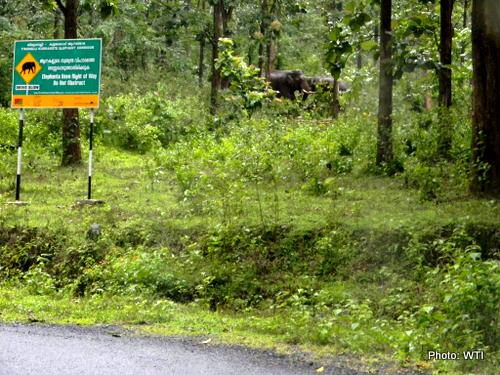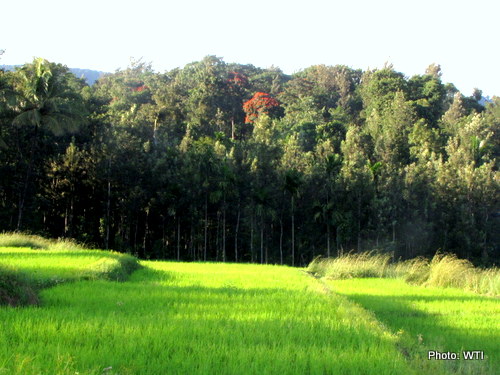WTI Provides Compensation to Tiger Attack Victim in Wayanad
Wayanad, June 3, 2015: Coexistence with wildlife has been the secret of forest dwelling communities for centuries, enabling them to have a sustainable living. Wayanadan Chetties is one such forest dwelling community in Wayanad Wildlife Sanctuary that has been dependent on the forests for livelihood and food.
Over the years, the population explosion has led to humans encroaching forests, leaving wild animals confined in small patches of forests and forcing them to venture out of forests in search of food, which leads to negative interactions between humans and wildlife. In the Nilgiri Biosphere Reserve, this conflict is rising with elephant, tiger, leopard, wild boar, spotted deer, monkeys, etc, often straying out of forests.
Emmadi in the Tholpety range of Wayanad WLS is one such village that has witnessed a rise in human-animal conflict in the last few years. Dominated by Wayandan Chetties, the resident of Emmadi depend on the forests for water, both for their household needs as well as agriculture. For this community close encounters with wildlife is a norm wherein their crops are raided and their livestock killed by predators. With more than 25000 people living around the Wayanad WLS, a mosaic of forests and human habitation has resulted in increasing conflict situations.
Rajesh, a 30-year-old man, is a farmer from Emmadi who cultivates paddy, coffee, fruits and vegetable on a piece of land and sources water from a waterhole near his house through a hose pipe. On March 23, Rajesh went out to repair the hose pipe with one of his relatives and while he was fixing the pipe, a tiger attacked him. Luckily, he saw the big cat approaching him and tried to ward off the tiger with his right hand. Even though the predator got hold of his hand, he succeeded in averting the attack and forcing the tiger to retreat back into the forest. However, his hand was severely wounded and there were deep claw marks on his back too. He was then admitted to a hospital and it took him a month to recover.
The expenses exceeded Rs one lakh which the family couldn’t afford. The Forest Department provided Rs 75,000 and that wasn’t enough. Rajesh is the lone earning member of the family and his parents suffer from chronic diseases. Moreover, the doctors said that he won’t be able to return to work for almost a year. Emmadi is on the fringe of the Thirunelli-Kudrakote corridor that facilitates wildlife movement between Brahmagiri Wildlife Sanctuary and Wayanad Wildlife Sanctuary.
Since Wildlife Trust of India (WTI) has been working on the corridor for past 10 years, the Asst Wildlife Warden of the area, Mr Rajan, enquired whether WTI could bear a part of Rajesh’s medical expenses. After consultations it was decided that WTI under its Executive Director’s Discretionary Grant (EDDG) would provide Rajesh with Rs 20,000. The cheque was handed over to him at the hospital by the Range Forest Officer in the presence of WTI team. The Forest Range Officer said, “The department’s resources are limited and hence support from WTI’s is crucial”. Mr. Rajesh appreciated WTI’s support and said that this monetary aid will help him pay a portion of his medical expenses.
More than Rs 10 million is paid annually as compensation by the forest authorities for a sanctuary which measures 344 sq kilometers. Mostly, the compensation amount is a meager sum as compared to the loss — less than one fourth of the actual loss.
Though, the Forest Department has provided conflict mitigation measures like solar fencing, elephant proof trenches, concrete walls, etc, around forests and agricultural fields, many a times these measures fail to deter animals from entering agricultural fields.
Conflict due to tigers straying into human habitations has created a huge outcry amongst the residents of these villages living around the Wayanad WLS. In the recent past, there have been multiple instances of human-tiger conflict which resulted in a tiger being shot and three others sent to captivity. The human casualties apart from the loss due to cattle lifting have made these people intolerant and sometimes violent towards wildlife. Mob of more than thousand people gather at the site during tiger conflict situations creating panic. The motives of certain people have led to the public sentiment going against conservation.
“WTI has been focusing on elephant corridors in Wayanad like elsewhere in India and has secured one corridor Thirunelli-Kudrakote elephant corridor by voluntary rehabilitation of four settlements. In such situations, we need to provide support to the locals so that they appreciate our work and become stakeholders in wildlife conservation,” said Jose Louies. Regional Head, WTI.












